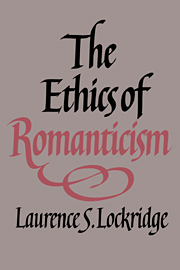2 - British Romanticism, Coleridge, and European moral traditions
Published online by Cambridge University Press: 16 September 2009
Summary
General observations
Though it is not the first thing on their minds when they sit down to write The Prelude, Prometheus Unbound, or even the Opus Maximum, the British Romantics conceive an ethics powerfully situated relative to major post-Renaissance moral schools. Linked by common vocabulary, sources, concerns, and varying degrees of awareness one of another, they respond to other traditions, contradicting, assimilating, supplementing, and transforming them in distinguishable patterns. No figure speaks consistently for the whole group – not even its biggest talker, Coleridge – but striking generalizations can still be made. The Romantics are knowledgeable about these schools – egoism, rationalism, sentimentalism, formalism, idealism, and utilitarianism – if not always profoundly so. Whenever they do not directly comment on these various “isms,” an implicit relationship can be discerned. What emerges is a strong ethical tendency identifiably their own. I argue that these literary figures take over issues usually handled by philosophers designated as such in our histories. I am not concerned here with laying out an intellectual “background,” but will describe the relatedness of the Romantics to these thinkers and will make reference only to those aspects of Hobbes, Shaftesbury, Kant, Schelling, Hegel, Godwin, et alii, that have bearing on the moral situation of Romanticism.
My reason for undertaking this discussion is that, despite the attention routinely paid Romanticism as a pivotal moment in cultural and intellectual history, no critic has yet systematically explored its ethical determinants within the larger discourse of European moral traditions.
- Type
- Chapter
- Information
- The Ethics of Romanticism , pp. 39 - 154Publisher: Cambridge University PressPrint publication year: 1989

